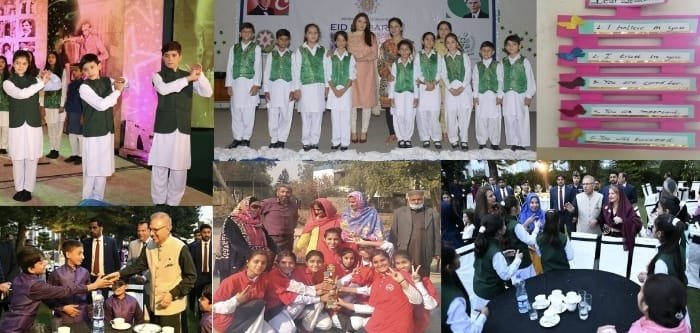“We lend our ears to the deaf, our tongue to the mute, we make them feel normal in this abnormal world where there’s only little acceptance for them.” Says MS. TABASSUM BEGUM (Vice Principle at HIC Special Education)
Hearing impairment is a broad term that refers to hearing losses of varying degrees from hard of hearing to total deafness. The major challenge faced by hearing-impaired students is communication. These students vary widely in their communication skills. Personality, intelligence, degree of deafness, type of residual hearing, the extent of benefit from amplifications by hearing aid, family environment, and age of impairment onsets is some of the factors that have an impact on the development of communication skills in students with hearing impairments.
In an interview with Ms Bilquees Bano: The four main areas of need for deaf and hard-of-hearing students are communication and interaction, cognitive and learning behavioural, emotional, and social development, and sensory or physical element of development. “Teachers deal with these students on an individual level, we take monthly tests for their assessment and keep an eye on student’s learning patterns and social behaviour, our students compete with federal college students in various competitions such as sports, painting, Olympics games,” says the member of sports organizing committee.
With the growing number of these students, they are obtaining their education in regular classroom settings with specialized assistance from their teachers with deaf education training and these students in Pakistan are also being prepared for board exams with modified sly-buss and with teacher’s patience and hard work all students have passed the board exams. According to the research, a variety of complex aspects, including their family environment their socioeconomic position, and parental education level as well as the experiences they face within and outside the school also contribute to the academic achievement and experiences of these children.
These elements specifically include traits of these students, such as language skills and communication style. “We counsel the children as well as their parents because sometimes even parents don’t understand their child’s problems, therefore we have made a group where we all teachers and parents interact with each other and it’s a safe place for parents to open up about their child,” says Vice principle of HIC Special Education.
It’s very difficult for students to study with this disability, as we all know it’s an even more difficult job to teach and help these students in academics. But perhaps the most important thing teachers communicate to students and the community is a sense of satisfaction with their choice of teaching as their life mission. Teaching at its highest level is a calling and good teachers feel it to its core, so what motivates them to teach these students? “I believe that these students are a neglected part of our society, even their parents don’t understand them, so if I am capable enough to communicate with them through sign language and hear them out, it’s a pleasant feeling for me, especially whenever they succeed in any field of life it motivates me even more.” Says Ms Bilqees Bano.
We cannot deny the fact they are a part of our society, it’s high time that we start seeing them as a potential part of our society and stop treating them as if they are a burden because God may have made them disabled but there’s more to them, in research, it is proven that deaf people or hard-of-hearing people are very intelligent and quick learners than most of us. NSEC for HIC give these students a chance to excel in life just like every other student gets, NSEC provides education to students with hearing impairment issues till BA, and for those students who cannot study but are good at practical work, they are sent to NTCS, where they learn skills like Arts, Fashion Designing, Tailoring, Sportsman, Beauticians, Computer, Data Entering, Cooking, Agriculture, Electric Wiring, as long with studies. Students with hearing impairment can also opt for teaching others as a teacher when they grow up.
Local businesses operated by hearing-impaired people
In Pakistan, people with hearing impairment have to go through many hoops to get where to want to be professionally, and otherwise, they are subjected to odd-ism, discrimination, and prejudice against individuals who are deaf and hard of hearing. The social enterprise fast food chain “ABEY KHAO” is focused on employing Pakistan’s deaf population run by young individuals with hearing impairment, this business enterprise paves the way to give opportunities to the deaf community despite their disability, this business is well managed by deaf people. People can order their food in sign language help of posters that decrypt the language for them. Learning sign language also attracted clients who enjoy learning it and the amusive atmosphere from the deaf professionals.
“I’ve been working with ABEY KHAO for the past years. It’s so easy to work here. I feel that we all are treated equally here and a large number of hearing customers visit me and have no trouble placing an order, this gives us a sense of empowerment and we hope to empower more deaf people by providing them with employment” says an employ working at ABEY KHAO. This reflects the positive image of Pakistani youth boosting the economy and encouraging people with hearing impairment.


